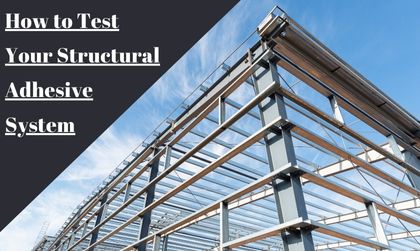 Using industrial adhesives for structural bonding requires the development of a testing protocol to test the effectiveness of the bonded system. Every testing protocol developed should add value to the structural design. Structural joining often utilizes pressure-sensitive tapes, although other industrial adhesives such as coil applied adhesives provide structural integrity to mechanical systems.
Using industrial adhesives for structural bonding requires the development of a testing protocol to test the effectiveness of the bonded system. Every testing protocol developed should add value to the structural design. Structural joining often utilizes pressure-sensitive tapes, although other industrial adhesives such as coil applied adhesives provide structural integrity to mechanical systems.
Considerations When Testing Structural Adhesives
Three of the most important considerations when testing structural adhesives include asking the following questions:
- What are the explicit expectations of the adhesive?
- What conditions will the mechanical structure and the adhesive encounter, both environmentally and mechanically?
- Are there risks to the mechanical system or subsystem if degradation occurs over time and exposure?
Adhesives bond substrates with intrinsic mechanical properties that vary from the materials joined. The properties of the adhesive must be apparent to vendors and the end user for modeling purposes. Adhesive property considerations include:
- Adhesion values specified related to the substrate and joint engineer design
- The bonding characteristics and the range expected in dynamic applications
- The stability of the surface when exposed to adverse conditions
- The joint design which incorporates the adhesive, with consideration to peel resistance.
Adhesives perform better in shear or compression, a quality joint design may convert tensile loads into shear or compression or may utilize mechanical fasteners like rivets, crimping, or welding to enhance peel performance. Perpendicular T-joints and butt joints should be avoided in design whenever possible.
Proper use of structure modeling and joints is critical. This can significantly save time, materials and labor with random testing. If modeling ability is unavailable, samples must be produced, exposed to real life situations such as with simulations to achieve statistical significance.
In regard to the type of test that should be performed when testing a structural adhesive system, these tests are generally grouped into four basic categories:
- Shear tests of joints
- Adhesive mechanical properties
- Peel testing of joints
- Environmental conditioning
ASTM D638 Test For Tensile Mechanical Properties
According to Instron, a world leader in materials testing for more than 75 years, ASTM D638 is the most common testing standard for determining the tensile properties of plastics. Testing the tensile properties includes applying a tensile (pulling) force to the material and then measuring that particular substrate’s response to the tensile stress.
With the increasing use of plastics replacing metal in many applications, such as lamination bonding applications which create composites that are often just as strong or even more durable than metal, there is a need for manufacturers to properly test and gauge the mechanical strength of structural adhesive systems.
Risk and Safety of Structural Adhesive Systems
Mitigating risk is of the utmost importance in many applications such as in automotive production and building materials. Considering the risk of which safety is a mitigating factor should be applied to the most adverse conditions, with a performance margin of at least 20% or up to 50% applied to joints under the worst expected conditions.
UNICHEM: Leader In Manufacturing and Testing Adhesives
Universal Chemicals & Coatings, Inc., UNICHEM, is a leading custom coatings, chemicals, and industrial adhesives manufacturer providing high-quality adhesives for use in a wide range of industries and market segments. We follow strict quality policies and perform testing of all materials including real world simulations in our state-of-the-art laboratories. Our uniBOND industrial adhesive is proven in countless laminating applications, providing structural integrity and long-lasting, reliable bonding performance.
UNICHEM consists of a team of high-tech resin, polymer and adhesive experts with the knowledge to develop testing protocols to meet and exceed customer requirements. We provide solutions for laminating to metal, lamination bonding for rubber, vinyl laminate adhesives and more. Contact us with any questions and to ensure that your structural adhesive system meets all application and environmental considerations for reliable bonding performance.


